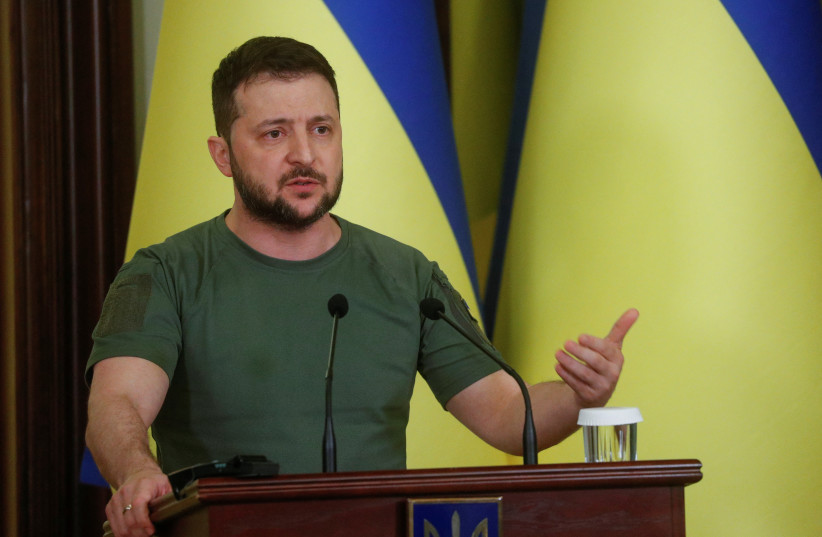Israel is leaning toward expanding its aid to Ukraine, including sending military assistance to the embattled country.
Israeli officials have said Jerusalem can send “plenty of items” to Kyiv that are more defensive, but air-defense systems, advanced weaponry and attack systems would not be sent, Haaretz reported.
The increase in aid would be a “substantial step” compared with what Israel has already provided, and would be more symbolic and “not include substantial quantities of supplies” because of the aid already provided by the US and European countries, the report said.
Jerusalem has been trying to strike a balance between Russia and Ukraine, but Haaretz quoted a source as saying the US and some European countries expect Israel to take a clearer stance regarding which side it is on “and to back its decision with deeds and not just statements.”
A meeting by defense officials is planned for the coming days to discuss what platforms or supplies can be provided to Ukraine.

The Defense Ministry did not comment on the report.
Last week, Brig.-Gen. (res.) Dror Shalom, head of the Defense Ministry’s Political Security Division, took part in a US-led summit that discussed international defense aid to Ukraine.
Israel was among 43 countries – 29 NATO members and 14 non-NATO members – that attended the summit in Germany. Shalom’s participation could be viewed as a possible shift in stance by Israel, which has been attempting to preserve its close ties with Moscow.
Two weeks ago, Defense Minister Benny Gantz said Israel would send protective vests and helmets to Ukrainian rescue and emergency services. The shipment – an apparent boost of aid following criticism that Israel was not providing enough aid to Ukraine – was not for the Ukrainian military.
As part of Israel’s aid to Ukraine, Jerusalem also set up a field hospital in Lviv, and donated several armored, four-wheel-drive ambulances from Magen David Adom.
Russia is a key player in Syria, where the IDF is carrying out airstrikes against Iranian and Hezbollah targets. It intervened in the Syrian conflict in September 2015 on the side of embattled President Bashar Assad, and Moscow is seen as being the main power to speak with when Israel wants to carry out strikes.
Israel has a deconfliction mechanism with Russia when carrying out operations in Syria, but Moscow has recently criticized strikes carried out by the IAF.
Ties were strained after Russian Foreign Minister Sergey Lavrov said Hitler was Jewish.
“When they say, ‘What sort of denazification is this if we are Jews,’ well I think that Hitler also had Jewish origins, so it means nothing,” Lavrov said in an interview with Italy’s Rete 4 on Sunday. “For a long time now, we’ve been hearing the wise Jewish people say that the biggest antisemites are the Jews themselves.”
Israeli officials expressed outrage at the comments, and Foreign Minister Yair Lapid said they were “unforgivable and outrageous.”
“Jews did not murder themselves in the Holocaust,” Lapid said. “The lowest level of racism against Jews is to accuse Jews themselves of antisemitism.”
The Foreign Ministry on Tuesday summoned Russian Ambassador to Israel Anatoly Viktorov to a meeting. The Russian Foreign Ministry doubled down on the comments on Tuesday, saying Israel supports neo-Nazis in Ukraine.
Ukraine has been at war with Russia since Moscow invaded and annexed Crimea in 2014. However, a recent report by the Stockholm Peace Research Institute (SIPRI) found that Kyiv’s imports of major arms from 2017-2021 were very limited.
“Deliveries of arms to Ukraine generally had more of a political than military significance, which grew in importance as the tensions between Russia and Ukraine worsened at the end of 2021,” the report said.
While Kyiv was already fighting pro-Russian rebels in the Donetsk and Luhansk regions from 2017-2021, “its imports of major arms remained very limited and accounted for only 0.1% of total global arms imports,” it said.
The Czech Republic was Ukraine’s main supplier of major arms, accounting for 41% of total imports, including 87 armored vehicles and 56 pieces of artillery. The US was Ukraine’s second-largest supplier, accounting for 31% of all imports, including 540 light anti-tank missiles.
France, Lithuania and Poland also supplied arms to Ukraine. Turkey sold 12 armed, unmanned aerial vehicles to Ukraine and “probably” had the largest military impact, the SIPRI said. The Bayraktar drones are currently being used in the war, accounting for the destruction of hundreds of Russian tanks, ships and other military platforms, it said.
SIPRI attributed the low level of arms transfers to Ukraine’s limited financial resources and its own arms-production capabilities.
“Up until February 2022, several of the largest arms-exporting states had been restricting exports to Ukraine due to concerns that such transfers could contribute to conflict escalation,” it said.
